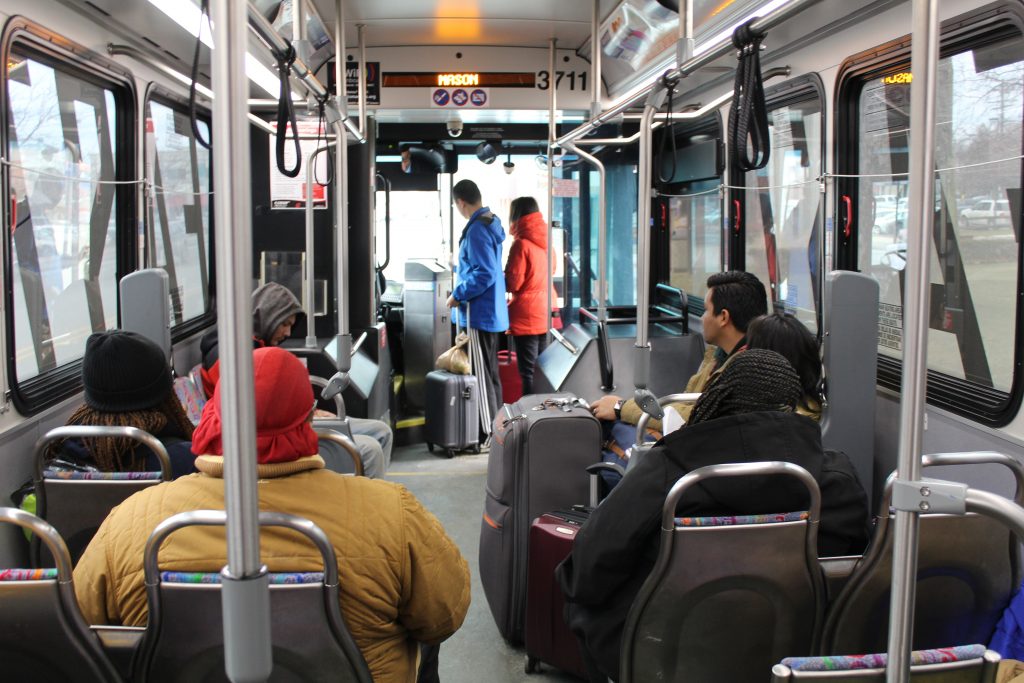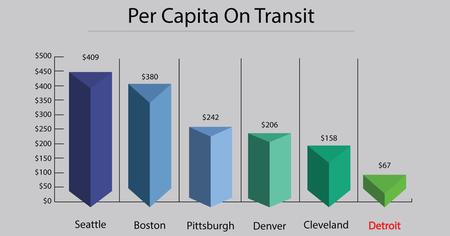Changing This 2011 State Law Could Get Transit on the Ballot in 2020
After two failures to get a regional transit funding plan passed, the RTA has a plan to amend a state law that could allow Detroit and pro-transit counties to seek new transit tax in 2020.

The Regional Transit Authority of Southeast Michigan has struggled to get public funding since its inception.
In 2016, the RTA asked voters for a tax of 1.2 mills. It failed because most voters in Macomb County said “no.” In 2018, Macomb County Executive Mark Hackel and Oakland County Executive L. Brooks Patterson blocked efforts to put a 1.5-mill proposal on the ballot.
“The longer we wait on this, the more expensive it will get. If we don’t get it done, our children will.” – Khalil Rahal, Wayne Co. Economic Development Director
Patterson died in 2019. His successor, Dave Coulter, has supported regional transit for years. Coulter is joining leaders in Wayne and Washtenaw counties and Detroit Mayor Mike Duggan in a new effort to put the RTA back on the ballot in 2020.
They’re seeking a change in state law that would allow the county commissions to put the millage on the ballot without having to get approval from individual communities in those counties.
Khalil Rahal is Wayne County’s economic development executive. He says amending the Municipal Partnership Act is the first step toward a regional transit plan.
“It slices the pie the way people want,” Rahal says. “For those [counties] that want regional transit, they get to be in. Those who don’t want in don’t have to be.”
Rahal says an effective transit system would boost the region’s economy.
“We have so many people that can’t get to where they need to go.” – Khalil Rahal, Wayne Co. Economic Development Director
Macomb County chose not to participate in the latest RTA millage effort. County Executive Mark Hackel has said fixing roads is a higher priority than mass transit. Rahal says if a new transit millage passes, Macomb County could join the new transit system in the future.
Right now, there is no formal plan for regional transit. Rahal says RTA leaders have learned a lot from their 2016 and 2018 plans. He says the authority has to do a better job of explaining why regional transit is important, even for people who don’t use it.
“For every dollar you put into public transportation, it puts $4 back into the economy,” Rahal says. “It can lower your auto insurance. It can lower your health insurance, because it will result in fewer deaths and accidents, even if you don’t use public transportation, because it will take more cars off the road. That ultimately lowers emissions. It means more mobility options for people who don’t have mobility.”

Rahal says other cities spend far more than Detroit on regional transit, including Seattle, Boston, Pittsburgh, Denver and Cleveland. He says the longer local officials wait, the more expensive it will become.
A bill to amend the Municipal Partnership Act has been introduced in the Michigan House of Representatives.
Click on the player to hear Khalil Rahal’s conversation with WDET’s Pat Batcheller, and read a transcript, edited for clarity, below.
Pat Batcheller, 101.9 FM, WDET: We’re talking about amending the Municipal Partnership Act of 2011. What is it, and what changes need to be made to facilitate regional transit?
Khalil Rahal, Deputy Wayne County Executive: It was put in place to allow municipalities to raise millages to provide more effective service. Under the act, neighboring villages, cities, townships and counties can get together to raise a millage, go to the voters and try to provide more effective service. It’s the tool we want to use to try to provide better regional transit service.

With past RTA millages, did you need to get buy-in not just from the counties, but also all the local governments to get them on the ballot?
Under the RTA, everybody has to agree. There are five parties to the agreement: The city of Detroit, Wayne, Oakland, Macomb and Washtenaw counties. Should any one of those say no, the whole thing falls apart.
The whole reason why we want to use the Municipal Partnership Act is because it can be more nimble. It can allow those who want to be in, to be in. And those who don’t want to be in don’t have to be. It needs some amendments. There are some really technical things. The first is to make sure that the bodies voting are participating in the RTA. This would have to be an election countywide. It would have to pass individually in each county in order for it to work out. That’s Wayne, Oakland and Washtenaw counties.
Why is Macomb County not part of this?
I think Macomb County is happy with their level of service. They didn’t feel like it was a priority for them. We in Wayne County believe it is a priority for us. Today, we have so many people that can’t get to where they need to go. Whether it’s young people who need to get to jobs or education, whether it’s seniors who can’t get to medication or the hospital, or even with the freedom of mobility, it’s service we think we have to provide.
If the law is changed, what happens next?
If it changes, then it’s up to the parties — Detroit, Wayne County, Oakland County, and Washtenaw County — to get together to put together a transit plan that we think will work. And if we come to an agreement, we have to take that plan to each legislative body, which has to vote on it. Once that happens, we start a campaign to put it on the ballot for November 2020.
Do you mean the legislative body in each municipality in those counties?
Not each municipality, just each party to the agreement. The Detroit City Council would have to vote on it, and all three county commissions.
What if a local government in one of those counties doesn’t want to be part of this?
That’s the beauty of the Municipal Partnership Act. It’s very nimble and it’s something everyone needs to take into account. The good news here is it is going to go up for a vote. And if people do not believe in it, they can vote against it.
Do you have a regional transit plan right now?
There have been many plans that have been made public. In 2016, we had a plan that almost passed. We learned a lot from that. There was a lot of heavy capital investment down certain arteries. People said they wanted more blanket coverage, more transit stops near their homes and jobs. And so, after hearing that feedback, we took the 2016 plan and devised a new plan for 2018 with a different philosophy. That plan had much more blanketed service. And we learned a lot from that. We never got the opportunity to put that plan on the ballot, but we’ve learned a lot since then. Every day, the RTA is out talking the the public. SMART is out talking to riders, D-DOT is talking to riders, The Ride in Ann Arbor is talking to riders. We are getting constant feedback.
So there’s still work to be done before you have a final plan?
Absolutely, and I would hope that if we come to an agreement, we hope to show that final plan to the public in the spring of 2020.
Do you think enough state lawmakers would support changes to the Municipal Partnership Act?
We hope so. It is a local option, and it slices the pie the way people want. For those of us who want regional transit, we get to be in. For those that aren’t comfortable, they get to be out. We can’t let just any one person stop the region from advancing.
If the law does not change, is regional transit dead?
I wouldn’t say it’s dead. But certainly we need to change the law to make it go where we need to go. The longer we wait on this, the more expensive it will get. If we don’t get it done, our children will.
What else would you like to say?
I think those of us in government right now think we can do better at explaining the need for regional transit to those who don’t necessarily use it. Every major metropolitan area in the world has learned the benefits of public transit. I’m not just talking about New York, Los Angeles or Chicago. Think about Cleveland, Minneapolis, St. Louis, Phoenix, Portland and Indianapolis. These are smaller metropolitan areas who have invested in some cases more than double what Detroit spends locally on public transportation.
And they reason they do it is because for every dollar you put into public transportation, it puts $4 back into the economy. The other half of that equation is it can lower your costs in other areas. It can lower your auto insurance. It can lower your health insurance, because it will result in fewer deaths and accidents, even if you don’t use public transportation, because it will take more cars off the road. That ultimately lowers emissions. It means more mobility options for people who don’t have mobility. Virtually every other metropolitan area has figured this out, and we’re the last ones to do it.
Would having fewer cars on the road hurt our local automakers?
We haven’t seen that in other metropolitan areas that have public transportation. And some of the biggest advocates are the automakers. That’s because they’re in a fight, like everyone else, for talent. Our young folks do not want to drive, because driving gets in the way of their texting. They want to take public transportation. We spend about $69 per person on public transportation. Silicon Valley spends over $600 a person. Corporations are heavily in favor of public transportation.
